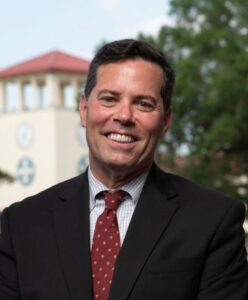 2 min read March 2022 — In a conversation with Invest:, President Jeffrey Senese of Saint Leo University shared the positive and challenging aspects the university and higher education sector have experienced since the pandemic began. He discussed how the industry is changing, how the university addresses affordability and accessibility and provided his outlook for the near term.
2 min read March 2022 — In a conversation with Invest:, President Jeffrey Senese of Saint Leo University shared the positive and challenging aspects the university and higher education sector have experienced since the pandemic began. He discussed how the industry is changing, how the university addresses affordability and accessibility and provided his outlook for the near term.
What were the major highlights and challenges from the past year?
We’ve moved more heavily into an enriched online environment for our adult students. Eighty percent of our students are adults, with 8,000 of them on campus or at our locations. With online learning, we’ve moved to a model that is not transactional but rather a rich support system. We have a Student Life division that focuses on the life of our online students. We offer them a variety of options, from lecturers to career services, financial aid and academic counseling in a richer environment. We also have a number of hybrid courses. What we’ve realized throughout the pandemic is that people are looking for that connection in the materials, their faculty and their classmates. We’ve followed CDC guidelines to mitigate the challenges brought on by COVID but our operations have remained relatively the same. We’re fully open and operating in the new normal.
Mental health has been a challenge over the last several years. The pandemic significantly exacerbated the issue. We have 24/7 online and in-person services in an emergency for our students. We’ve added a crisis response team as well. We have a committal law called the Baker Act. We’ve seen an increase in students needing support. We also have our own healthcare professionals on campus. We filled a contract with an external provider to offer more operational hours for our students. This generation is more open to asking for help and sharing when they need help.
Which professional skills are experiencing the greatest demand in the region?
We have strong social work, criminal justice and IT programs that are in high demand. These three areas have experienced a boom within the region. During the pandemic, we added a robotics and AI program in an effort to look toward the future. People are examining software design and development while automated technologies are the next step. We have a partnership with a national university to create a holodeck experience where we can modify the environment so that students can confront different situations and learn how to mitigate those situations in a better way in the real world. Online learning environments will be more interactive. That type of immersion, surrounding ourselves with learning, is where we’re headed for the long term.
Liberal arts degrees are still needed in terms of being able to communicate well with others and sharing your ideas concisely. It’s important for one to know how to piece together a coherent argument. AI and augmented reality can’t take over the human ability to do these types of things. In an increasingly automated world, the skills attained through a liberal arts degree still matter. The underpinning of liberal arts will always remain; it won’t disappear. It will only evolve.
How do you balance providing rigorous courses with affordability and accessibility?
We’ve always remained focused on accessibility as an institution. We haven’t increased tuition in the last three years, although we will increase it in the upcoming year out of necessity. We have donors who provide funds for scholarships. We’re middle of the road in terms of costs, with a $25,000 tuition and our students paying $12,000 a year on average. Thirty-five percent of our student population is Caucasian while 65% of our students are people of color. We make our institution as affordable as we can and we’re always looking for ways to be more affordable. I’ve raised over $2 million toward these efforts. We offer more opportunities for Catholic students who attended a Catholic high school in the region to offset their costs. I also discussed with my admissions program about creating a program focusing on Latino and African American men as their retention rates are the lowest.
How do you envision the future of higher education?
The key for the future will be to scale and build partnerships. We’re going to niche our programs while building programs with other universities that have different program offerings. You can’t be all things for all people. The industry is shifting and the economic model is different. We have implemented programs that are taught and advised by Spanish speakers. We’re meeting with our students in South America to build our market presence on the continent. Education remains an important aspect of life and provides a great range of opportunities that offer a great return.
What is your near-term outlook and what are your priorities for Saint Leo University?
We have several large development projects underway. We opened our wellness center, which is 60,000 square feet with an infinity edge pool beside the lake, a health clinic that is open to the community and a gym. The main gym can house up to 800 people. In the next several years, we’ll become the focus of Tampa Bay. We’re looking forward to the future. Returning to the markets where we didn’t have a physical presence is a priority, such as our military bases. Ensuring that we’re ahead of the technological curve is important, too. We also want to make sure we’re providing a rich experience to each of our students.
For more information, visit:
